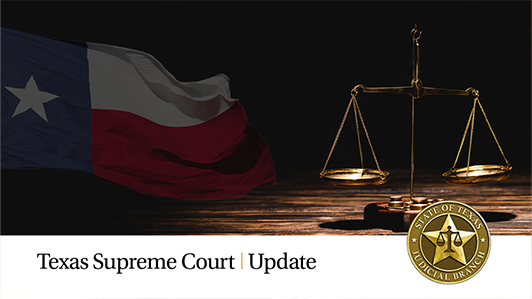The following are summaries of selected opinions issued by the Texas Supreme Court in March 2024. These summaries are prepared by court staff as a courtesy and are not a substitute for the actual opinions. The summaries are overviews of particular aspects of the opinions; please review the entire opinions.
GOVERNMENTAL IMMUNITY: Governmental entity contract deemed properly executed until entity provides notice of failure to submit disclosure of interested parties.
Legacy Hutto v. City of Hutto, No. 22-0973, ___ S.W.3d ___ (Tex. Mar. 15, 2024) (per curiam) .
This case concerns statutory requirements for a contract between a governmental entity and a business entity.
Legacy Hutto sued the City for its failure to pay for work Legacy had performed under a contract.
Section 2252.908(d) of the Government Code prohibits a governmental entity from entering into certain contracts with a business entity unless the business entity submits a disclosure of interested parties to the governmental entity when the contract is signed. Legacy had never submitted the disclosure. The City argued that the lack of disclosure meant that the contract was not “properly executed,” as required by Chapter 271 of the Local Government Code, which waives a governmental entity’s immunity to suit for breach of contract. The City thus argued that its immunity to suit was not waived for Legacy’s claim. The City filed a plea to the jurisdiction and a Rule 91a motion on that basis.
The trial court granted the City’s plea and motion but also granted Legacy leave to replead. Both parties appealed.
The court of appeals affirmed, holding that Chapter 271’s waiver of immunity requires compliance with Section 2252.908(d). The court of appeals also held that the trial court’s consideration of the City’s Rule 91a motion was inappropriate due to the court’s lack of subject-matter jurisdiction but that any complaint about that error was moot. Finally, the court held that it lacked appellate jurisdiction to review the order granting Legacy leave to replead, as that order was not final or otherwise appealable.
Both parties petitioned for review. After they had done so, the Legislature passed HB 1817, which amended Section 2252.908 to require that a governmental entity notify a business entity of its failure to submit a disclosure of interested parties. HB 1817 also provides that a contract is deemed to be “properly executed” until the governmental entity provides notice to the business entity. Lastly, it permits a court to apply the new statutory requirements to already-pending cases if the court finds that failure to enforce the new requirements would lead to an inequitable or unjust result.
Due to this change in the law, the Supreme Court granted the petitions for review, vacated the court of appeals’ judgment, and remanded for the trial court to conduct further proceedings in accordance with the new statutory requirements.
PROFESSIONAL NEGLIGENCE: Petition for review granted in dispute over anti-fracturing rule.
Rivas v. Pitts, No. 23-0427 (pending), appealing ___ S.W.3d ___, 2023 WL 3070811 (Tex. App.—Austin 2023), pet. granted (Mar. 15, 2024).
At issue in this pending case is whether a plaintiff can maintain fraud and breach of fiduciary duty claims against his accountants.
From 2007 to 2018, Brandon Pitts and other accountants at the Pitts & Pitts firm provided accounting services to Rudolph Rivas, a custom home builder. These services included preparing tax returns and financial statements, defining ledger accounts, and training Rivas’s staff in various accounting skills.
In 2016, Rivas discovered several accounting errors that had artificially inflated the valuation of shareholder equity in his company. Rivas had to pay millions of dollars to various financial institutions to avoid defaulting on loans. Rivas also struggled to secure new lines of credit, and several of his businesses have since failed.
Rivas sued the accountants for professional negligence, breach of contract, breach of fiduciary duty, and fraud.
The accountants filed a traditional and no-evidence motion for summary judgment as to each claim. The trial court granted the accountants’ motion without stating its reasoning.
The court of appeals affirmed in part and reversed in part. The court first held that Rivas had waived or confessed error with respect to his negligence and breach of contract claims, and it affirmed the summary judgment for those claims. That left Rivas’s claims for fraud and breach of fiduciary duty.
The accountants argued that these claims are barred by the
anti-fracturing rule, which prohibits a plaintiff from converting a claim for professional negligence into some other common law or statutory claim. The accountants also argued that there is no evidence to support either claim. The court of appeals rejected both arguments and reversed the summary judgment with respect to the fraud and breach of fiduciary duty claims.
The accountants petitioned the Supreme Court for review, urging their antifracturing rule and no-evidence points. The Supreme Court granted the petition on March 15, 2024.

